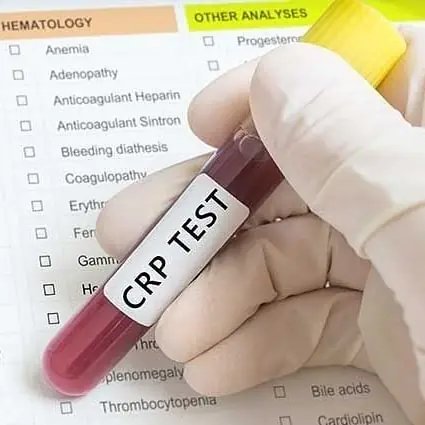Content :
🏾 What is C-reactive protein (CRP)?
C-reactive protein (CRP) is a protein produced by the liver in response to inflammation in the body. Discovered by Tillett and Francis in 1930,, CRP is a pentameric protein, meaning it is composed of five identical subunits. Its levels rise significantly during acute or chronic inflammation, making it a useful marker for detecting and monitoring inflammatory conditions.
Your doctor may order a CRP test if you show symptoms of inflammation, such as fever, pain, or swelling. This test is also used to:
- Guide treatment for bacterial infections.
- Monitor inflammatory processes in autoimmune diseases like rheumatoid arthritis or lupus.

How is the CRP test performed?
Preparation: No special preparation is usually required for a CRP test. However, if your blood sample will be used for additional tests, you may need to fast for 8–12 hours beforehand.
Medications: Inform your doctor about any medications you are taking, as some (e.g., aspirin, ibuprofen, or estrogen) can affect CRP levels.
🏾 What is the normal CRP level?
CRP levels are measured in mg/L or mg/dL (1 mg/dL = 10 mg/L). While "normal" values can vary slightly between laboratories, the general guidelines are:
| CRP Level (mg/L) | Interpretation |
|---|---|
| < 10 | Normal (no significant inflammation) |
| 10–50 | Mild to moderate inflammation |
| > 50 | Severe inflammation (often bacterial) |
Factors that can affect CRP levels:
- Age and gender (CRP levels may be slightly higher in women).
- Hormone replacement therapy or oral contraceptives.
- High body mass index (BMI) or obesity.
- Smoking or alcohol consumption.
- Certain medications (e.g., aspirin, ibuprofen, or statins).
🏾 How to interpret my CRP results
High CRP Levels
Mild elevation (10–50 mg/L): May indicate inflammation, but further tests are needed to determine the cause. Possible conditions include:
- Infections (viral or bacterial).
- Autoimmune diseases (e.g., rheumatoid arthritis, lupus).
- Chronic inflammatory conditions (e.g., irritable bowel syndrome, tuberculosis).
- Certain cancers (e.g., lymphoma).
Very high elevation (above 50 mg/L): Often associated with bacterial infections or severe inflammatory conditions.
Chronic inflammatory diseases: A high CRP level may indicate a flare-up or ineffective treatment.
🏾 Covid-19 and C-reactive protein
A significant increase in CRP was found with levels averaging 20 to 50 mg/L in patients with COVID-19.
Patients with severe disease course had much higher CRP levels than mild or non-severe patients.
🏾 What other tests could I have with this test?
- Sedimentation Rate: Like CRP, this test measures inflammation.
- Antinuclear Antibody Test: Measures auto-antibodies attacking your cells. This is important in the diagnosis of certain autoimmune diseases.
- Rheumatoid Factor (RF): This test is done to help diagnose and monitor rheumatoid arthritis.
- Anti-Cyclic Citrullinated Peptide (Anti-CCP) Antibody: This test is done to help diagnose and monitor rheumatoid arthritis.
🏾 C-reactive protein and Pregnancy
Pregnancy can cause a mild elevation in CRP levels, especially during the later stages. This is due to the natural inflammatory changes that occur in the body during pregnancy. However, very high CRP levels may indicate an underlying infection or complication and should be investigated further.
🏾 Difference Between CRP and Sedimentation Rate (ESR)
Compared to erythrocyte sedimentation rate, which is an indirect test of inflammation, CRP levels rise and fall rapidly with onset and suppression of inflammatory stimulus, respectively.
🏿 Frequently Asked Questions
Q: What does a high CRP level mean?
A: An elevated CRP test result is a sign of acute inflammation. This may be due to a serious infection, injury, or chronic illness. Your doctor will recommend further tests to determine the cause.
Q: My doctor prescribed a CRP test to detect an infection!!
A: Your doctor may order a CRP test to check for an infection if you have symptoms of inflammation such as fever, chills, flushing or flushing, nausea, vomiting, rapid breathing and/or rapid heart rate.
Q: Does CRP increase in viral infections?
A: CRP levels can also increase when you have a viral infection. But they do not rise as high as during a bacterial infection. Your doctor will recommend further tests to determine the cause.
Reference
- Sara M - C Reactive Protein
- University of Rochester Medical Center Rochester - C-Reactive Protein
- Jennifer Huizen - What does it mean if you have a high C-reactive protein?
- Medical Encyclopedia. C-reactive protein. Updated January 31, 2021 - C Reactive Protein
- labocorp - C-Reactive Protein (CRP)
- The Johns Hopkins University - Assessing Cardiovascular Risk with C-Reactive Protein
- W S Tillett - SEROLOGICAL REACTIONS IN PNEUMONIA WITH A NON-PROTEIN SOMATIC FRACTION OF PNEUMOCOCCUS
- Nurshad Ali - Elevated level of C‐reactive protein may be an early marker to predict risk for severity of COVID‐19